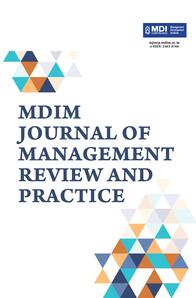
1Department of Management, Brainware University, Kolkata, West Bengal, India
2Adamas University, Kolkata, West Bengal, India
3Aligarh Muslim University, Murshidabad Centre, Murshidabad, West Bengal, India
Creative Commons Non Commercial CC BY-NC: This article is distributed under the terms of the Creative Commons Attribution-NonCommercial 4.0 License (http://www.creativecommons.org/licenses/by-nc/4.0/) which permits non-Commercial use, reproduction and distribution of the work without further permission provided the original work is attributed.
The Indian stock market and the investors’ confidence level was affected badly by COVID-19 crisis. World Business Council for Sustainable Development (2020) had stated that investor decision-making at the present time is influenced by the sustainability orientation of the companies. In the context of COVID-19 crisis, it is important to project investor behaviour in the post-lockdown phase to understand the stock market potential. This research has attempted to perceive the status of economic resurgence with respect to two Bombay Stock Exchange (BSE) green indices, that is, CARBONEX and GREENEX. A comparative analysis of such indices has been performed over the lockdown and unlockdown phases until 20 July 2021. This research attempted to find if the indices were significantly different in lockdown and unlockdown phases. A significant mean variance would indicate development in sustainable business operations since lockdown period and an increment in such values would draw better investment in Indian stock market in future, even amid further mild COVID waves with partial lockdowns. One-way between-the-groups ANOVA has been performed to see if the means of CARBONEX and GREENEX indices are significantly varying in the aforementioned phases. A significant variance will help the Indian investors to look forward to the post-COVID economic reinstatement.
COVID-19, BSE CARBONEX, BSE GREENEX, lockdown, unlockdown, investor behavior
Bhandari, B., Arshdeep, Jindal, K. (2020). Performance evaluation of socially responsible stocks in India –A study on BSE CARBONEX index. Studies in Indian Place Names, 40(1), 1524–1537.
Bhattacharya, R. (2013). Effect of going green on stock prices: A study on BSE-GREENEX. International Journal of Computer Applications. https://research.ijcaonline.org/icgct/number1/icgct1310.pdf
BSE India. (2022, April 30). S&P BSE indices. https://www.bseindia.com/Indices/IndexArchiveData.html
Choudhary, R., & Jain, V. (2018). A study on impact of stock market movements on GREENEX. Journal of Emerging Technologies and Innovative Research. https://www.jetir.org/papers/JETIR1805267.pdf
Gautam, S. (2020). The influence of COVID-19 on air quality in India: A boon or inutile. Bulletin of Environmental Contamination and Toxicology, 104, 724–726.
Kootanaee, A. J. (2014). EVA (economic value added) an evolution in the financial performance measurement. Science & Knowledge Publishing.
Mahato, S., Pal, S., & Ghosh, K. G. (2020). Effect of lockdown amid COVID-19 pandemic on air quality of the megacity Delhi, India. Science of the Total Environment, 730, 1–23.
Martensen, A., & Dahlgaard, J. J. (2009). Strategy and planning for innovation management – a business excellence approach. International Journal of Quality & Reliability Management, 16(8), 734–755.
McKinsey & Company. (2019). More than values: The value-based sustainability reporting that investors want. https://www.mckinsey.com/capabilities/sustainability/our-insights/more-than-values-the-value-based-sustainability-reporting-that-investors-want
Sacuia, V., & Dumitru, F. (2013). Market-based assets. Building value through marketing. Procedia—Social and Behavioral Sciences, 124, 157–164.
Sharma, P., & Jasuja, D. (2020). Socially responsible investing and stock performance: A study on comparison on sustainability indices in India (ARCH & GARCH Approach). Delhi Business Review, 20(1), 85–97.
Sharma, S., Zhang, M., Anshika, Gao, J., Zhang, H., & Kota, S. H. (2020). Effect of restricted emissions during COVID-19 on air quality in India. Science of the Total Environment. https://doi.org/10.1016%2Fj.scitotenv.2020.138878
Shields, M. D. (2015). Effective long-term cost reduction: A strategic perspective. Journal of Cost Management, 6(1), 16–30.
Sicard, P., Marco, A. D., Agathokleous, E., Feng, Z., Xu, X., Paoletti, E., Rodriguez, J. J. D., & Calatayud, V. (2020). Amplified ozone pollution in cities during the COVID-19 lockdown. Science of the Total Environment, 735, 1–10.
Singh, M. K., & Neog, Y. (2020). Contagion effect of COVID-19 outbreak: Another recipe for disaster on Indian economy. Wiley Public Health Emergency Collection.
The Indian Express. (2021, May 9). COVID-19 second wave: Here’s a list of states that have imposed full lockdown. https://indianexpress.com/article/india/covid-19-second-wave-heres-a-list-of-states-that-have-imposed-lockdowns-7306634/
Thomas, C. (2020). Sensex, Nifty end at record high on vaccine progress. Reuters. https://www.reuters.com/article/india-stocks-idINKBN28J0BW
Tripathi, V., & Bhandari, V. (2015). Socially responsible stocks: A boon for investors in India. Journal of Advances in Management Research, 12(2), 209–225.
Wagner, M. (2013). ‘Green’ human resource benefits: Do they matter as determinants of environmental management system implementation? Journal of Business Ethics, 114(3), 443–456.
World Business Council for Sustainable Development. (2020). Investor decision-making. https://www.wbcsd.org